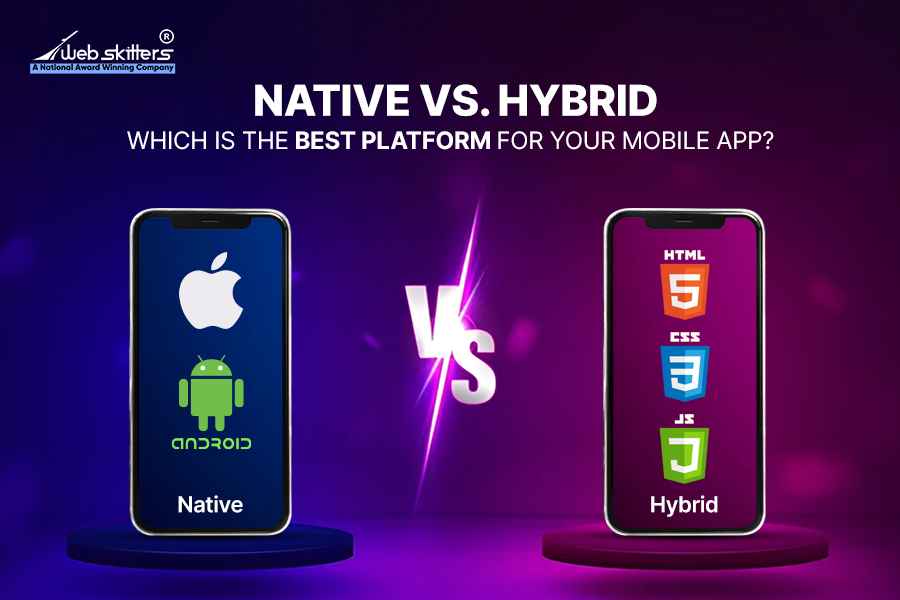
Native vs. Hybrid: Which is the Best Platform for Your Mobile App?
Mobile apps are convenient, functional, and widely utilized by US citizens. The reasons are prominent: apps offer an elevated user experience over desktop versions. They are faster and can be accessed from anywhere. Additionally, mobile applications deliver an improved personalized experience, better engagement, and conversion.
If you are a business owner reading this, turning to mobile apps can boost your business manifold. It can help you achieve numerous objectives and beat some of the best competitors in the market.
However, where should you begin?
There are two kinds of mobile apps available in the market – native app and hybrid app. Native apps are developed for particular operating systems. Hybrid apps, on the other hand, are an amalgamation of a native app and a web app.
Businesses can opt for any of the two options, depending on their needs, objectives, and priorities. This comprehensive read explores more native vs. hybrid apps and the advantages and disadvantages of each. By the end of this read, we will help you make an informed decision based on your business needs.
Understanding Native Apps
Native mobile apps are for particular operating systems or platforms. Currently, the two most dominating operating systems are Android and iOS. So, the native app can run on either platform—an Android or iPhone.
These applications are built by skilled application developers using platform-specific programming languages. For instance, an application for iPhone will be developed in an Xcode environment using Swift. Similarly, developers will utilize Java or Kotlin for Android applications.
Features of a Native App
Native applications have robust features and utilize the inherent features and components of the device seamlessly. These apps are scalable for various business needs with minimal support and deliver optimum user experience. However, some unique features of Native Apps can be highly beneficial to businesses of every size –
- High Performing
As the name suggests, ‘native’ apps interact natively with the operating system and act like the OS to provide the maximum performance. These applications are fast and highly responsive to specific operating systems.
- Optimized Presence
The apps are optimized and compiled using APIs and the core programming languages. This makes them more advanced and efficient. Additionally, these can leverage the device’s processor and deliver fast usability.
- Elevated Experience
Native apps are well-regarded for a seamless and intuitive user experience. They adhere to the user-centric web design guidelines and the standards of the respective platforms. The user-focused design approach ensures consistency and familiarity for the target audience.
- Device Accessibility
Native applications can seamlessly utilize device features, such as the camera, GPS, accelerometer, etc. Developers leverage nativity to create feature-rich applications with advanced functionalities depending on the device.
- Offline Functionality
Native applications function offline, another significant feature. The apps can store data locally on the device, and users can access certain features without an internet connection, making them a convenient alternative.
- Security Features
Like other online presences, native applications undergo rigorous testing of processes and functionalities, including security benchmarks. The applications are inherently more secure than others and protect sensitive user data.
- Integration Capacity
Native applications seamlessly integrate with other apps and services on the designated devices. This enhances the users’ experience. They can easily share data and interact with system-level functionalities. With native apps, users experience a cohesive ecosystem of interconnected applications.
- Tailored Development
A native app is known for its tailored features for specific devices – especially UI and UX. Personalized development aligned with platform guidelines and standards results in a consistent and polished app creation.
These advantageous features of native applications make them a popular choice among business owners. Additionally, proficient Native app developers are easy to find and can deliver services catered to target audiences’ needs.
The Native App Development Process
Essentially, the native app development process has five steps. When done by an efficient team of professionals, it ensures a successful application outcome.
Here is the step-by-step native app development process –
- The first step is deciding upon the native mobile app platform. There are numerous options to choose from, such as Flutter, React Native, Apache Cordova, etc. Each platform offers unique features and functionalities. Additionally, several other factors can influence the decision, such as the target audience, project requirements, etc.
- Once the platform is selected, native developers must select an Integrated Development Environment or IDE suitable. Android Studio is the most selected IDE for Android development among developers.
- Native apps are created using platform-specific programming languages and frameworks. Java or Kotlin are commonly used for Android development.
- The application interface is a crucial aspect of native app development and must be designed with the user in mind. Developers follow platform-specific design guidelines to ensure the UI/UX is intuitive, appealing, and consistent to meet user expectations.
- The development phase entails coding, implementing features, and integrating third-party libraries or APIs as needed. The team of professionals utilizes the programming languages, frameworks, and development tools to build the app’s functionality.
- The testing phase is a mandatory step of the development process. It ensures that the application created is free of bugs and errors. Various types of testing—unit testing, integration testing, and user acceptance testing—are conducted to identify and address any issues.
- The application must comply with the app store guidelines for the deployment phase. Upon successful publication, it will be accessible to every Android user.
Native applications must be maintained and updated for long-term success. Maintenance entails bug fixing, addressing user feedback, and adding new features. Additionally, the application must be compatible with the latest OS versions and devices. Updates are essential to keeping the app relevant and competitive in the market.
Advantages of Native App
Now that we have discussed the key features and the development process – let us delve into how a native app can benefit you as a business owner.
There are numerous advantages of native applications over other mobile apps. Several experienced app development companies and tech-savvy business owners prefer native apps.
Here are a few celebrated advantages –
- High Performance and Speed
Native apps use platform-specific languages and frameworks. These allow complete access to the device’s hardware and software. Users can experience superior performance and responsiveness, providing a smooth and seamless experience. Additionally, the apps load faster, respond quickly to user interactions, and deliver high-quality performance with resource-intensive tasks.
- Access to Device Features
As mentioned earlier, one of the prime advantages of native apps is their access to the device features. A well-developed native can access mobile device features like a camera, GPS, accelerometer, and microphone. It adds to the innovative functionalities of the device and delivers a tailored experience.
- Enhanced User Experience
The feature-rich applications meet platform guidelines and standards and ensure an engaging experience with a rich and robust environment. The intuitive interface enhances user experience and satisfaction, leading to increased conversions.
The overview of advantages highlights why native apps are preferred for many mobile app development projects. From superior performance to enhanced user experiences, native apps are a compelling solution to numerous businesses, irrespective of industry type.
Understanding Hybrid App
Hybrid apps are developed using HTML, CSS, and JavaScript and then wrapped in a native container. They combine native and web apps and are deployed on multiple platforms, including iOS and Android.
Hybrid apps are balanced in terms of their advantages and limitations. They utilize a single codebase, and developers can write code once and deploy it everywhere. The development approach is streamlined and reduces the time and resources required.
Hybrid applications leverage frameworks such as Apache Cordova, Ionic, or React Native. These offer native device features through plugins or APIs and allow developers to use web technologies for the interface and logic.
Hybrid applications excel in cross-platform compatibility and faster development cycles. However, they may face performance and user experience limitations compared to native apps.
Hybrid apps are becoming increasingly viable for development projects and closing the popularity gap.
Features of a Hybrid App
Hybrid apps combine native and web application elements. Therefore, these applications offer unique characteristics and features catering to specific business needs.
Here are some key characteristics and features of hybrid apps –
- Cross-Platform Compatibility
Hybrid apps run on multiple platforms, including iOS, Android, and web browsers. The cross-platform compatibility allows developers to write code once and deploy it across different operating systems. It reduces development time and effort.
- Single Codebase
Hybrid apps use a single codebase for development. The web technologies include HTML, CSS, JavaScript, and frameworks like Apache Cordova or Ionic to package the code into native containers for each platform.
- Access to Native Features
Hybrid apps can access native device features and functionalities through plugins or APIs provided by the frameworks. Developers can incorporate features like camera access, GPS location, and push notifications, similar to native apps, and experience enhanced functionalities.
- Faster Development Time
Since hybrid app developers write and maintain a single codebase, they can update and modify features more efficiently. It reduces the time-to-market for the app.
- Cost-Effective Alternative
Hybrid app development is a cost-efficient alternative to native app development. It is a beneficial stance for businesses and startups with limited resources. The code base is reusable across multiple platforms, and the streamlined development process leads to significant cost savings.
- Web-Based User Interface
Hybrid apps utilize web technologies for their user interface. It allows developers to create dynamic and interactive UIs using familiar web development tools and frameworks. The flexibility enables rapid prototyping and iteration of the design specifics.
- Offline Functionality
Similar to native apps, hybrid apps offer offline functionality by caching data locally on the device. It allows users to access app features with or without internet connectivity.
- Deployment Benefits
Hybrid apps can be deployed to apps like the Apple App Store and Google Play Store, just like native apps. They cater to a broader audience of mobile users and efficiently leverage all the app store features.
The characteristics and the feature-rich environment of hybrid apps make them an attractive option for developers and businesses. These are a brilliant option for cross-platform engagement and efficiently deliver a native-like user experience.
The Hybrid App Development Process
The hybrid app development process is similar to the native app development process. However, the development phase requires adept professionals to make the applications cross-platform friendly.
Here is the step-by-step hybrid app development process –
- Start by determining the target platforms for the hybrid app. The most common platforms include iOS, Android, and web browsers.
- After the platform comes the choice of an Integrated Development Environment (IDE) suitable for hybrid app development. The popular options include Visual Studio Code, Atom, or WebStorm.
- We advise selecting a hybrid app development framework that aligns with the project requirements. Common frameworks include Apache Cordova, Ionic, React Native, and Flutter.
- Cross-platform UI frameworks are different from native frames. Consider this when designing a responsive app. Additionally, developers must focus on consistency across multiple screen sizes and resolutions.
- The development stage is essential in a Software Development Life Cycle. The app code using web technologies such as HTML, CSS, and JavaScript must be robust, clean, and functional. This phase involves implementing app logic, interactions, and navigation flows according to the project requirements.
- Thorough testing on multiple devices helps identify and resolve the bugs. Additionally, it is crucial to ensure compatibility across different devices and operating systems. Several aspects are determined during this phase – responsiveness, performance, user experience, and UI/UX.
- The deployment of hybrid applications is critical. The app is packaged using a command-line interface or framework tools for the respective stores.
- Most businesses use steady app development support to address bugs, security vulnerabilities, and enhancements.
These are the necessary steps and best practices for successful hybrid app development. A hybrid app is an excellent choice for businesses looking forward to a cost-saving and quick development process.
Advantages of Hybrid App
Hybrid Apps are a popular choice for mobile app development for obvious reasons. Let’s explore Hybrid Apps and their advantages for businesses and professional app developers.
Here are the talked-about advantages of Hybrid App –
- Cross-Platform Compatibility
Hybrid apps run smoothly on multiple platforms, including Android, web browsers, and iOS. They run on a single codebase and offer consistent app experiences across different devices and operating systems. Additionally, businesses can cater to a broader audience without separate applications.
- Cost-Effective Solution
Developing a hybrid app is an efficient alternative to building separate native apps for each platform. Businesses and startups with limited budgets can benefit from the cost-effectiveness of hybrid app development and reach a broader range of users.
- Faster Development Time
Reusing code and streamlining development processes accelerates time-to-market for hybrid apps. Businesses can quickly respond to market demands and user feedback and focus on added functionalities to meet user expectations.
From cross-platform compatibility to faster development time, hybrid apps offer numerous businesses a compelling solution. Businesses can reach a broader audience of users in a reduced timeframe and with a lower investment.
Native vs. Hybrid App Comparison
One of the critical decisions mobile app developers and business owner’s face is choosing between native and hybrid approaches. Each platform and development cycle has advantages and disadvantages. Factors such as performance, user experience, and development time must be considered.
Let us delve deeper into the difference between native app and hybrid app based on essential factors –
- Performance
Native apps seamlessly leverage device hardware and software capabilities, resulting in high performance and responsiveness. They are optimized for the target platforms to load faster and respond quicker to user interactions.
Hybrid uses native containers to mimic the native apps. They lack performance due to the interpretation of web code and communication with native components. As a result, hybrid apps need help with graphics-intensive or computation-heavy tasks.
- User Experience
Native apps provide a seamless and intuitive user experience adhering to the design guidelines and standards of the respective platforms. They can access platform-specific UI components and deliver a polished and engaging user interface.
Hybrid apps strive to offer a native-like user experience. They utilize web technologies for the user interface and native wrappers to access device features. While a hybrid framework mimics native behavior, there may be subtle differences in performance, navigation, and UI elements. It leads to a not-so-efficient user experience.
- Development Cycle
There is a massive difference in the development cycle between native and hybrid apps. Native app development demands separate codebases for multiple platforms and requires a hefty amount of development effort.
On the other hand, hybrid apps use a single codebases to deploy across multiple platforms. Developers only write and maintain one set of code for all supported platforms. It is a significant advantage for both businesses and developers.
- Access to the Device
Native apps directly access the platform-specific APIs and device features and offer advanced functionalities. Additionally, they can integrate with system-level features and services to further enhance the user experience.
Hybrid apps access device features through plugins or APIs provided by hybrid frameworks. However, accessing specific functionalities can be limited or delayed.
Therefore, in terms of device features, hybrid apps may not offer the same performance or reliability as native apps.
Disadvantages of Native App
Yes, the features and functionalities of a native mobile app platform look impressive. However, both native and hybrid mobile app platforms have limitations. Learning the pros and cons is essential to make an informed decision.
We have listed some of the specific disadvantages of native apps for your business –
- Developing native apps for multiple platforms requires massive development efforts, which can increase time and cost. Additionally, maintaining the app versions can be more complex.
- Building the native apps will require hiring developers with platform-specific expertise. The development cycle is expensive and daunting for startups and budget-crunched businesses.
- Since the development cycle is longer than that of hybrid app development, market deployment takes time. This reduces competitiveness in this evolving marketplace.
Disadvantages of Hybrid App
Like native apps, hybrid apps cannot be free from limitations and business-oriented disadvantages. Let us explore –
- Hybrid apps lack performance, especially for graphics-intensive applications. Due to web code interpretation and native component communication, users can experience slower loading times and less responsive user experiences.
- Hybrid apps have limited access to certain device-specific functionalities. Compared to native apps, these can never achieve their full potential and reach a hyper-advanced level.
- The hybrid app development cycle relies on third-party frameworks and tools such as Apache Cordova, Ionic, or React Native. With a steady flow of updates and a complex framework roadmap, developers face limitations or dependencies.
If you are a non-tech-savvy business owner reading this, getting overwhelmed by these limitations is natural. We recommend consulting with a top-rated app development company for positive guidance.
Native Mobile App Platform
Native app development involves creating applications specifically for platforms like iOS or Android. The process utilizes platform-specific tools, languages, and frameworks.
Here is a quick overview of all the tools, languages, and frameworks commonly used for native app development –
For IOS development –
- Native iOS app development utilizes Apple’s development tools and frameworks.
- Xcode is the Integrated Development Environment (IDE) for iOS development that offers a suite of tools for writing, debugging, and testing.
- The programming languages used for iOS development are Swift and Objective-C.
- UIKit and SwiftUI are the main frameworks for building user interfaces. SwiftUI is a brand-new framework introduced by Apple.
For Android development –
- Native Android app development utilizes Google’s development tools and frameworks.
- Android Studio is the IDE for Android development that facilitates designing, building, and testing.
- Java is the primary programming language. However, Kotlin is an impressive alternative that has gained much popularity.
- Android SDK (Software Development Kit) is an essential element of Android app development and includes libraries, APIs, and tools.
- XML is used to define user interfaces and interact with the underlying system through Java or Kotlin code.
Whether you select an Android or an IOS app for your business needs, each has its designated environment. The development cycle entails platform-specific tools, languages, and frameworks to build applications tailored to business needs.
Hybrid Mobile App Platform
Hybrid app development combines web technologies with native wrappers to create applications. The application can function efficiently on multiple platforms.
Let us delve into the platforms supporting hybrid app development. We have offered an overview of the tools, languages, and frameworks used for hybrid app development.
- Apache Cordova or PhoneGap is an open-source framework for building hybrid mobile apps using web technologies. It entails a set of APIs to access native device features.
- Ionic is another popular open-source framework that uses web technologies like HTML, CSS, and JavaScript. It entails a library of UI components and pre-designed templates.
- Flutter develops natively compiled applications for all platforms. It offers numerous pre-built UI components and animation for supercharged applications.
Cross-platform mobile applications can be beneficial to numerous businesses. With the single codebase development features, the cycle is robust and fast and offers a quick market release.
Choosing between Native vs. Hybrid for your Business App
Through this meticulous read, we explored the Native vs. Hybrid app development approach and learned about the numerous vital features of each platform. Native is an excellent option for high-performing applications with massive traffic. However, hybrid is a great alternative for a quick and cost-efficient solution.
Whichever platform you choose for app development, ensure the final product is user-oriented. It must offer an elevated user experience, efficient functionalities, and streamlined processes for user interactions.
We suggest consulting with an industry-leading app development company for robust app solutions if you plan a mobile application for your business anytime soon.
Webskitters Technology Solutions Pvt. Ltd. aims to deliver the best applications built by industry experts. You can avail yourself of native and hybrid apps developed by dedicated professionals that cater to your needs. Consult for your application needs, and we will ensure it aligns with your objective and audience expectations.

 Ecommerce Development
Ecommerce Development 












